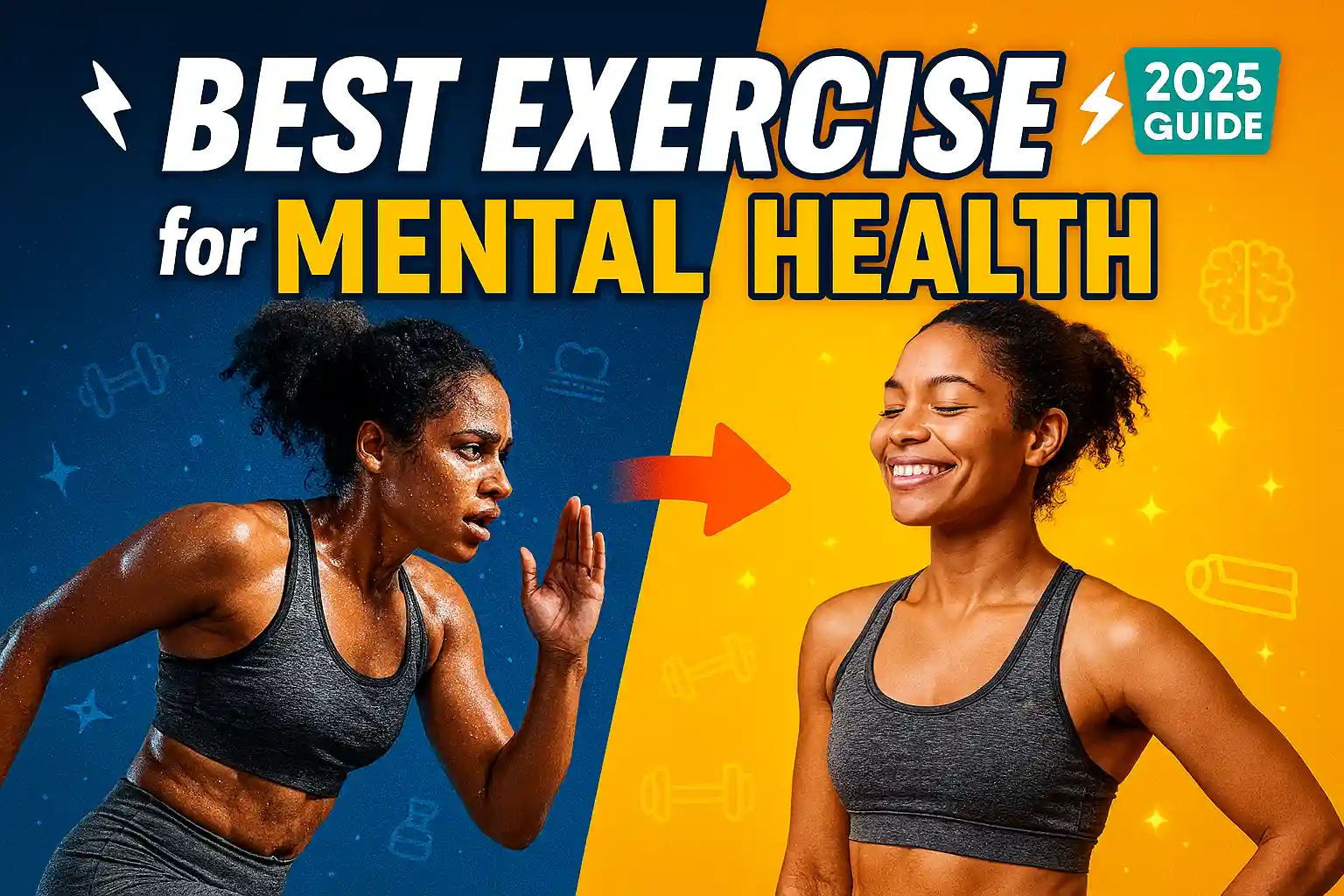
Best Home Workouts for Beginners
Discover how exercise really impacts mental health through personal stories, latest research, and actionable tips. From depression to anxiety – here’s what actually works.
I used to think people who said “just exercise” for mental health were being dismissive. Honestly? I rolled my eyes every time someone suggested a morning jog would fix my anxiety. But after years of struggling with depression and finally giving physical activity a real shot, I’m here to tell you something: they weren’t entirely wrong.
Don’t worry – this isn’t going to be another “exercise is magic” article. Instead, I want to share what I’ve learned from research, personal experience, and conversations with mental health professionals about how movement genuinely impacts our minds. Because the truth is more nuanced and way more interesting than the usual fitness advice.
Why Your Brain Actually Craves Movement
Here’s something most people don’t realize: our brains evolved for movement. For thousands of years, humans had to move to survive – hunting, gathering, escaping predators. Suddenly, in just the past century, we’ve become sedentary. No wonder our mental health is struggling.
When you exercise, your brain doesn’t just release those famous “feel-good” endorphins everyone talks about. That’s actually just the beginning. Your brain also pumps out serotonin (which helps regulate mood), dopamine (your reward chemical), and something called BDNF – brain-derived neurotrophic factor. Think of BDNF as fertilizer for your brain cells.
Dr. John Ratey, a Harvard psychiatrist, calls exercise “Miracle-Gro for the brain.” And after digging into the research, I can see why. Studies show that regular exercise literally changes brain structure, growing new neural connections and even increasing the size of the hippocampus – the area responsible for memory and learning.
But here’s what really got my attention: exercise can be just as effective as antidepressants for treating mild to moderate depression. A major study published in the British Medical Journal found that structured exercise programs helped people with depression just as much as therapy or medication.
15 Ways Exercise Actually Changes Your Mental State
1. It Kicks Depression to the Curb (Sometimes Better Than Pills)
This one hit close to home for me. During my worst depressive episode three years ago, my therapist kept suggesting I try regular exercise. I thought she was crazy – I could barely get out of bed, let alone hit the gym.
But research backs her up. A study following over 1,000 adults found that those who exercised regularly were 25% less likely to develop depression over the next decade. Even more impressive? For people already dealing with depression, regular exercise reduced symptoms by an average of 30%.
The key word here is “regular.” We’re not talking about one magical workout. Think of it like taking medication – consistency matters more than intensity.
2. Anxiety Becomes Way More Manageable
Remember that eye-rolling I mentioned earlier? Well, exercise proved me wrong on anxiety too. There’s something about rhythmic, repetitive movement that seems to calm the nervous system. Maybe it’s the focused breathing during a long walk, or the way your mind can’t race when you’re concentrating on not falling off a bike.
Research shows that just 20 minutes of moderate exercise can reduce anxiety for up to 12 hours afterward. I’ve started tracking this myself, and it’s pretty remarkable how much calmer I feel after even a short walk around the block.
3. Sleep Finally Makes Sense Again
If you’ve ever dealt with mental health struggles, you know the cruel irony: stress keeps you awake, but lack of sleep makes everything worse. Exercise breaks this cycle in multiple ways.
First, physical exhaustion helps. But more importantly, exercise regulates your circadian rhythm – your body’s internal clock. A study in the Journal of Clinical Medicine found that people who exercised regularly fell asleep 17% faster and slept 18% longer.
My personal sweet spot? Moderate exercise in the morning or early afternoon. Evening workouts sometimes leave me too wired to sleep.
4. Your Brain Gets Sharper (Like, Noticeably)
This one surprised me the most. About six months into a consistent exercise routine, I noticed I was sharper at work. Decisions came easier. I could focus for longer periods. Turns out, this isn’t just in my head.
Exercise increases blood flow to the brain and promotes the growth of new brain cells. Studies show improvements in memory, attention, and problem-solving abilities within just a few weeks of starting regular exercise.
One particularly fascinating study followed office workers who started taking walking meetings. Not only did their physical health improve, but they scored higher on creativity tests and reported better job satisfaction.
5. Stress Stops Controlling Your Life
Chronic stress is like having your car’s alarm system go off constantly – eventually, it wears down everything. Exercise acts like a reset button for your stress response system.
When you exercise, your body practices dealing with stress in a controlled way. Your heart rate goes up, you breathe harder, but then you recover. Over time, this teaches your body to handle real-life stress more effectively.
I used to feel overwhelmed by minor work deadlines. Now, after establishing an exercise routine, those same situations feel manageable. It’s like my stress tolerance expanded.
6. Self-Confidence Gets a Real Boost (Not Just From Looking Better)
Sure, physical changes from exercise can boost confidence. But the real magic happens mentally. There’s something powerful about setting a goal – like running for 30 minutes straight – and achieving it.
Every workout becomes proof that you can do hard things. This confidence transfers to other areas of life in ways I never expected.
7. Energy Levels Actually Increase (Counterintuitive But True)
I know, I know – exercise should make you tired, right? Short term, yes. But over time, regular exercise increases your overall energy levels. Better cardiovascular fitness means your heart doesn’t have to work as hard for daily activities. Improved sleep means better recovery. Enhanced mood means less emotional exhaustion.
8. Social Connections Become Easier
This one depends on how you exercise, but group activities, gym classes, or even walking with a neighbor can combat isolation – a major factor in depression and anxiety.
I joined a hiking group last year, partly for exercise and partly because I was tired of spending weekends alone. Those weekly hikes became a cornerstone of my social life and mental health.
9. Negative Thoughts Lose Their Grip
Exercise provides what psychologists call “behavioral activation” – essentially, it gets you out of your head and into your body. When you’re focused on your breathing, your form, or just not tripping over your feet, there’s less mental space for rumination.
I’ve found this especially helpful for anxiety spirals. A 20-minute walk can completely shift my mental state when worried thoughts start taking over.
10. Your Body Image Improves (In Unexpected Ways)
This isn’t about losing weight or building muscle (though those might happen). Regular exercise changes how you relate to your body. Instead of seeing it as something to criticize, you start appreciating what it can do.
After months of consistent exercise, I stopped obsessing over how my body looked and started marveling at how it felt. This shift was huge for my overall mental health.
11. Emotional Regulation Gets Easier
Ever notice how everything feels more manageable after a good workout? Exercise helps regulate emotions by literally changing brain chemistry. It also provides a healthy outlet for processing difficult feelings.
Bad day at work? Frustrated with a relationship? Sometimes the best therapy is a hard workout or a long walk.
12. Cognitive Decline Slows Down
This might not seem immediately relevant if you’re young, but building exercise habits now protects your brain for decades. Regular physical activity is one of the most effective ways to prevent dementia and cognitive decline.
13. Addiction Recovery Gets Support
For anyone dealing with substance abuse or behavioral addictions, exercise provides a natural alternative source of dopamine. It’s not a cure-all, but it’s a powerful tool in recovery.
14. Seasonal Depression Becomes Less Brutal
Winter has always been rough for my mental health. But combining exercise with outdoor exposure (even on cloudy days) has made seasonal affective disorder much more manageable. The light exposure helps, but so does the physical activity itself.
15. Overall Life Satisfaction Jumps
This is the big one – the umbrella benefit that encompasses everything else. Regular exercise consistently shows up in studies as one of the strongest predictors of life satisfaction and happiness.
What Actually Works: The Exercise Prescription for Mental Health
Okay, so exercise helps with mental health. But what kind? How much? How often? After researching dozens of studies and experimenting with different approaches, here’s what actually works:
The Magic Number: 150 Minutes Per Week
The World Health Organization recommends 150 minutes of moderate exercise weekly for physical health. Turns out, this is perfect for mental health too. That breaks down to about 30 minutes, five days a week – or you can chunk it differently.
But here’s the thing: you don’t have to start there. When I was struggling with depression, 30 minutes felt impossible. I started with five minutes of walking. No joke – five minutes.
Intensity Matters Less Than You Think
I used to believe that only intense, sweaty workouts “counted.” Research disagrees. Studies show mental health benefits from:
- Gentle yoga
- Leisurely walking
- Dancing in your living room
- Gardening
- Playing with pets
The key is moving your body regularly, not punishing it.
Consistency Beats Perfection Every Time
Three moderate walks per week will do more for your mental health than one brutal gym session. I learned this the hard way after years of boom-bust exercise cycles.
Now I aim for some movement every day, even if it’s just stretching while watching Netflix. Some days I hike for hours; other days I do 10 minutes of yoga. Both count.
The Best Types of Exercise for Mental Health
Aerobic Exercise: The Mood Booster
Running, cycling, swimming, dancing – activities that get your heart rate up consistently show the strongest antidepressant effects. You don’t need to become a marathon runner. Even brisk walking counts as aerobic exercise.
I personally love hiking because it combines cardio with nature exposure (another proven mood booster). Find what works for you.
Strength Training: The Confidence Builder
Lifting weights might seem unrelated to mental health, but research shows significant benefits. There’s something uniquely satisfying about progressive overload – gradually lifting heavier weights over time.
You don’t need a gym membership. Bodyweight exercises, resistance bands, or even carrying groceries can provide strength training benefits.
Yoga and Tai Chi: The Mind-Body Connection
These practices combine physical movement with mindfulness and breathing techniques. Multiple studies show they’re particularly effective for anxiety and stress reduction.
I was skeptical of yoga for years (it seemed too slow), but it’s become crucial for my mental health routine. The combination of movement, breathing, and present-moment awareness is powerful.
Team Sports: The Social Element
If isolation is part of your mental health struggle, team sports or group fitness classes kill two birds with one stone. You get exercise plus social connection.
Don’t worry about being good at sports. Adult recreational leagues are usually welcoming to all skill levels. I joined a casual volleyball league and made some of my closest friendships there.
Getting Started When Everything Feels Impossible
The biggest challenge with exercise for mental health is that mental health issues make exercise feel impossible. Depression saps motivation. Anxiety makes gyms feel threatening. Here’s how to work around these barriers:
Start Ridiculously Small
I mean it – ridiculously small. Can’t imagine a 30-minute workout? Try five minutes. Can’t face the gym? Walk to your mailbox. Can’t get dressed in workout clothes? March in place during commercial breaks.
The goal is building the habit, not burning calories or building muscle. Those will come later.
Use the Two-Minute Rule
Commit to just two minutes of movement per day. Usually, once you start, you’ll naturally do more. But even if you don’t, two minutes is infinitely better than zero minutes.
Make It Easy
Remove every possible barrier. Lay out workout clothes the night before. Find activities you can do at home. Choose something you actually enjoy (or at least don’t hate).
I keep resistance bands next to my bed so I can do a few exercises as soon as I wake up. No decision-making required.
Track Mood, Not Just Exercise
Keep a simple log of your mood before and after exercise. Seeing the pattern helps maintain motivation during tough times.
I use a 1-10 scale and jot down numbers in my phone. After a few weeks, the correlation becomes obvious.
Common Mistakes That Sabotage Success
Going Too Hard Too Fast
Enthusiasm is great, but burning out in week two helps nobody. I’ve made this mistake more times than I care to admit.
Start with less than you think you can handle. It’s easier to add more later than to recover from burnout.
All-or-Nothing Thinking
Missing a day doesn’t ruin everything. Life happens. The key is getting back to it as soon as possible without guilt or drama.
Comparing Yourself to Others
Social media makes this worse, but try to remember that everyone’s journey is different. Your depressed self getting out for a 10-minute walk is more impressive than someone else’s marathon PR.
Ignoring What You Actually Enjoy
Exercise doesn’t have to be punishment. If you hate running, don’t run. If you love dancing, dance. The best exercise is the one you’ll actually do.
Expecting Instant Results
Mental health benefits from exercise build over time. Some people feel better immediately, others need several weeks of consistency. Be patient with the process.
When Exercise Isn’t Enough
Let’s be clear: exercise is powerful medicine for mental health, but it’s not a cure-all. If you’re dealing with severe depression, anxiety, or other mental health conditions, exercise should supplement professional treatment, not replace it.
I still see my therapist regularly, even though exercise has dramatically improved my mental health. Some people benefit from medication plus exercise. Others need therapy plus exercise. The key is finding what works for you.
Red flags that indicate you need professional help:
- Thoughts of self-harm or suicide
- Inability to function in daily life
- Substance abuse
- Severe anxiety that interferes with basic activities
- Depression that doesn’t improve with lifestyle changes
Making It Sustainable for the Long Term
The mental health benefits of exercise only last as long as you keep exercising. Here’s how to make it stick:
Find Your “Why”
Mine is simple: I like who I am better when I exercise regularly. I’m calmer, more confident, and generally happier. Find your personal motivation.
Build Variety Into Your Routine
I rotate between hiking, yoga, strength training, and dancing. Variety prevents boredom and works different muscle groups.
Plan for Obstacles
Bad weather? Have indoor options. Traveling? Research hotel gyms or local trails. Injured? Find modified exercises you can still do.
Celebrate Small Wins
Completed a week of daily walks? That’s worth celebrating. Tried a new type of exercise? Awesome. Acknowledge progress, no matter how small.
Connect With Others
Whether it’s a workout buddy, fitness class, or online community, social support makes exercise more enjoyable and sustainable.
The Bottom Line
Exercise isn’t a magic pill for mental health, but it’s pretty close. The research is overwhelming, and my personal experience backs it up. Regular physical activity can significantly improve mood, reduce anxiety, enhance sleep, boost confidence, and increase overall life satisfaction.
The key is starting where you are, not where you think you should be. Five minutes is better than zero minutes. Walking is better than nothing. Something you enjoy is better than something you hate.
Your mental health is worth the investment. Your future self will thank you for starting today, even if today’s start is just a walk around the block.
Remember: you don’t have to be perfect. You just have to begin.

